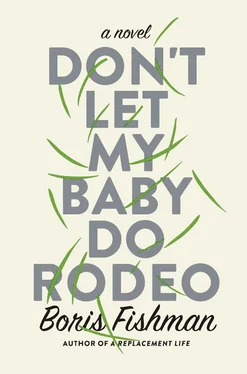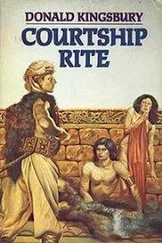“No, you’re going to find him on that bus,” Alex said acidly.
Embarrassed, Maya turned away and stared out the window. She counted the lights that craned over the roadway. The earth did not begin to rise until you got well north of Acrewood — some parts of the state rose to three thousand feet; Eugene skied there every winter, e-mailing Alex, Maya, and Max photographs of himself, ski-suited and goggled like an Austrian, and of his wife, set up by the lodge fireplace with a book and a sour-apple martini — but even in Acrewood you had an intimation of approaching foothills. The Corolla climbed a short hill; a row of streetlamps came into view; Maya counted them until the road dipped again; and they disappeared once more.
As in all such stories, Alex and Maya almost did not meet. Alex, just a year out of college, was living in south Brooklyn with his parents. The Rubins had been in the country more than a decade, Eugene already pressing pickles and jam on the American public (these Turkish, but with the dissolution of the Soviet Union two months before, the time was ripening for inroads into their former homeland). Alex was with his friend Dima, who lived on the Upper West Side, a year older and Russian, meaning not Jewish, which made Alex want to know how Dima’s family had gotten out, and years before the Rubins too, but Alex never asked. They played hockey in Riverside Park every Saturday with a spontaneous assembly of Russian programmers and restaurant Hispanics. That day, Alex watched their train roll past the 110th Street subway stop and turned questioning eyes on Dima. “I left my lucky puck at Maya’s,” Dima said idly, setting off in Alex a customary irritation at his friend for dispensing information as if to an employee. “You’ll get to meet her, finally.” Dima picked his nose.
Can’t play hockey without pucks. Alex had played once in Minsk using a rubber ball, which bounces rather than slides, becoming much easier to miss, but the aluminum hockey stick keeps slicing through the air until its toe lands in Alex’s astonished mouth, excavating two incisors, leading Alex’s mother, Raisa, to burst into the bathroom, where Alex stands under a hot shower tonguing the new grooves in his mouth, and demand to know whether the boy who hurt him was Jewish, and only upon being told yes he was Jewish does she relent and return to the kitchen to cry into her fist instead of rushing into the yard to avenge her son. And Alex understands for the first time, a six-year-old, the value of pragmatic deceit, for the boy was not Jewish but he had hardly designed to hurt Alex.
Outside, in the yard, where older boys sometimes appear demanding last names, which helps them determine who to beat on for sport, Alex must pretend he isn’t a Jew. He has a Russian Orthodox last name ready just in case, and God help his friends if they raise their eyebrows when he offers it. Meanwhile, here in the apartment, Alex must lie in the opposite direction and insist to his mother that those who abuse him out there are Jews, so she doesn’t embarrass him by flying outside with a broom. These are important, heavy, turgid lessons for a six-year-old mind. The two front teeth grow back, though one grows back crooked, and sometimes Raisa props open her son’s mouth so that she can try to force its edge straight with the pad of her thumb, saddling her son with a complex — otherwise he grows up to have white teeth, veined arms, perfect skin — until Maya Shulman tells him that it is her favorite part of him, that one renegade tooth in pursuit of its own ends, and when she learns the English word snaggletooth , it becomes her nickname for him, which annoys him because it highlights the flaw, so she gives it up.
A puck — it is nothing, but to Alex it is a lead pulley on his heart, the things that lovers leave in each other’s homes to say: Part of me lives here now. And so Alex declines to accompany Dima upstairs, to press his face even more tightly against the window of the joy in which others live; it is enough to hear his mother wonder when a girl deserving her Alex will finally appear in his life, which is an acceptable way of asking Alex when he will finally bring home a girl deserving of his mother’s attention. Alex is all of twenty-three. His American friends are at work on their careers, or on the girls who frequent their neighborhood bars, but none have marriage in mind. But Alex — Minsk Jew, a Rubin, only son — checks a different timetable.
Dima badgers his friend to come upstairs. His friend says that if he joins Dima, Dima will take forever, but if he remains downstairs, Dima will feel guilty for staying upstairs too long. But if you stay downstairs, I might get distracted by my girlfriend and stay even longer, Dima says, emptying another vial of despair into Alex’s heart. Dima’s girlfriend, Maya, is hosting some kind of dinner — she cooks, that’s her thing, she’s always at the stove, dipping and measuring — and so she’ll be busy, in any case. It’s freezing out here. Come on.
As Alex walks with Dima into the vestibule of the building, the lead pulley briefly lets go because how can Dima abscond to a hockey game if Maya is in the middle of preparing a dinner? Is Dima not expected at dinner? Is Alex to take this as a sign of intimacy (Dima and Maya are so flawlessly united that they hardly have to perform kindnesses for each other), or of subdermal friction? Alex notices himself wishing for the latter despite never having met Maya.
As they ride the elevator to the sixth floor, the smell of urine filling their nostrils, Alex observes that Dima’s girlfriend did not have to leave Kiev if she wished to live in a building whose elevator smells like urine and rumbles like it is about to snap off its cables. Dima reminds his friend that his girlfriend doesn’t have a father in imports; she’s in the fourth year of a four-year college visa, and her parents are now jobless because what was up is now down in Kiev, Ukraine, two months after the Soviet Union’s offed itself. Her father has found several hours a week tending a boiler in the basement of an infectious-diseases hospital — that’s it. Chastened, Alex asks informational questions: How old are her parents? What will Maya do when the school year is finished? Dima shrugs: Go home. She can’t obtain a visa extension? Alex insists, his sympathy now engaged alongside his guilt, a powerful pairing. Dima shrugs. He hasn’t thought about it, it seems, and again Alex marvels at his friend.
But then Dima’s face casts aside the heaviness forming between them. “You’re such a burden of gloom, Rubin,” he says, a loving sneer on his face. “Don’t make me regret asking you up.” And as the elevator completes its ride to the sixth floor, its bell emitting a tired, old-fashioned peal, Alex thinks that this is why he keeps close to Dima, even if Dima doesn’t know it and even if there are things about Dima that set Alex on edge — he envies the way Dima can gently unburden any load (onto the ground, onto Alex’s shoulders). And just walk off. And just walk on.
On Maya’s landing, they are assaulted by a screech from somewhere on the floor, adding to Alex’s sense of having left Manhattan for a dismal high-rise in a muddy Ukrainian city. Alex is hard-pressed to name the animal; the cry is strangled, a last appeal from a besieged corner. A half minute passes and they hear it again.
“They raise parrots for kid parties,” Dima nods across the hall, then shoulders open the door to 6E.
Following Dima, Alex steps from a cold, dusty stairwell with a burned-out lightbulb into heat, aroma, and light. The aroma is familiar: Alex’s Belarus and Maya’s Ukraine cook the same things, only call them by different names. Alex makes out onions, garlic, vegetable oil. He even sees a cloud of steam roll out of the kitchen doorway as if belched by a dragon. He thinks uncomfortably of the parrot once more, and as if on cue, another shriek — drawn-out, lordly — reaches them from the hallway.
Читать дальше












